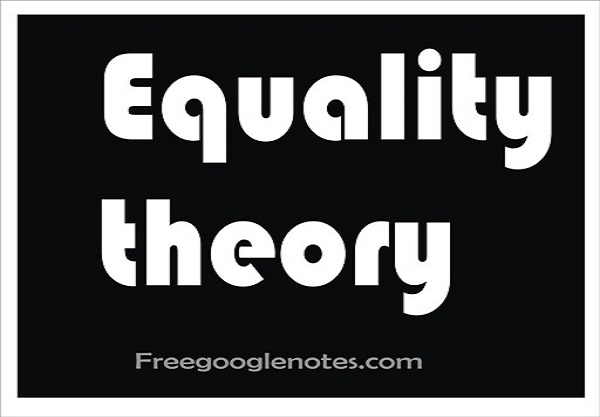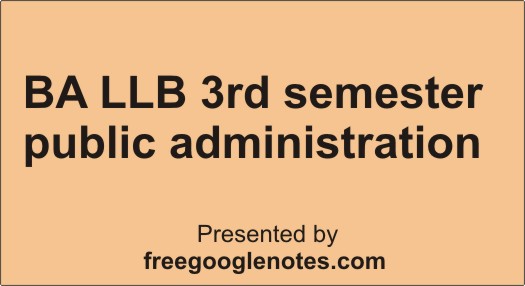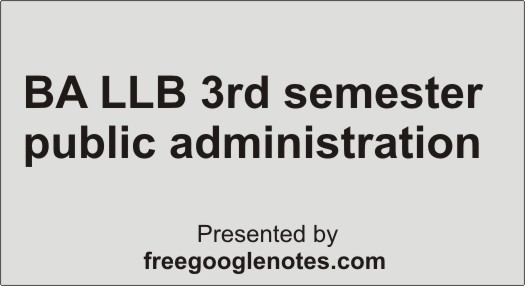EQUALITY
Q. 1. Define Equality and explain its main characteristics.
Ans. Equality, its definitions and meanings. Some scholars are of the view that equality means that nature has created all men equal and that all men shall be equal in respect of their income, living standard and enjoyment of facilities and natural resources. All men are born equal and they should share the blessing of nature on equal basis. They should be treated alike in all walks of life.
But this not the correct view of equality. It is wrong to say that all men are born equal. Some are non intelligent, some are born fools, some are born physically sound and some are weak from birth, some we bad by nature and some are good. Needs of all the men are also not equal and identical. Some have more capacity to work and some are less capable of doing the same thing. All men cant not be given
Political Theory equal work, equal pay and equal standard living. Thus equality does not mean that all men are to be treated on equal basis in every aspect. Broadly speaking equality means that there should be no discrimination between man and man on the basis of caste, color, creed sex, place of birth or race and that all should be given equal opportunity for making progress according to their natural faculties and capabilities and that there should be no privileged class in the society.
Scholars have given different definitions of equality and few of them are given below:
According to Earnest Braker, “Principle of equality accordingly means that whatever conditions are guaranteed to me in the form of rights. shall also and in the some measure be guaranteed to others, and that whatever rights are given to others shall also be given to me.”
According to Laski, “Whatever rights inhere in another by virtue of his being a citizen must inhere, and to the extent in me also.” He also says that “Equality does not mean an the identity of treatment or the sameness of rewards. If a brick layer gets the same reward as a mathematician or a scientist, the purpose of the society will be defeated. Equality, therefore, means first of all the absence of special privileges. In the second place, it means that adequate opportunities are laid open to all.”
From above definitions, equality means that there should be no discrimination between the people on the basis of caste, colour, creed, sex etc. and all should have equal rights and opportunities for making development of life. Characteristics of Equality
From the various definitions of equality we come to know of the following characteristics of equality :
1. Absence of Special Privileges. There should be no privileged class in the society. No man or group of men in society should be given special privileges. All men should be given equal rights and opportunities and no special privileges should be given to any person on the basis of caste, colour, creed, sex, race or wealth etc. Discrimination, if any, should be based on relevant grounds. For example, a blind man has to be given some special privilege as compared to person who is physically fit in all respect. An old man cannot be treated one equal basis with young men in a competition of race.
2. Equality before law. Equality means that all men should be treated equal before law and equal laws should apply to all the persons.
There should not be different sets of laws for different persons on the
caste, colour or creed. An ordinary person should be liable to
Same punishment for violation of a law as the other persons are. No person should be treated above law,
Equal Opportunities for Development. Equality means that opportunities for development should be available to all the person in the society. With the availability of equal opportunities, cons will make progress according to their mental and physical
capabilities, according to their merit. No man should be denied the opportunity of progress simply on the basis of caste, colour, creed sex or race. All men have equal right of receiving education which is the mainspring of good life. It is wrong to treat a particular class or group that they are born only to serve the other.
4. Equal Satisfaction of Basic Needs. Equality means that all men have equal right satisfaction of their basic needs of food, clothing and shelter. All men must be guaranteed the minimum standard of living before some are allowed to earn plenty and lead comfortable or luxurious life. Laski has said, “I have no right to take cake if my neighbour because of that right is compelled to go without bread.” He also says, “There must be sufficiency for all before there can be superfluity for a few.”
Q. 2. Explain various kinds of Equality.
Ans. Kinds of Equality. Like liberty, there are various kinds of equality, which are as under :
1. Natural Equality 2. Civil Equality 3. Social Equality 4. Economic Equality 5. Political Equality.
1. Natural Equality. It means that nature has created all men equal and that they should enjoy the resource of nature on equal basis. All men are born equal and nobody is rich or poor by birth. Declaration of Rights in France after French Revolution and Declaration of American Independence have supported this view. According to then nature has bestowed all blessings on all men equally and they all should share them on equal basis.
But the concept of natural equality, like natural liberty is not practical and real. It is wrong to say that nature has created all men equal. All men are not born equal. Some are born intelligent, some are born fool, some are born physically strong and some are born physically eak. All men are not equal in their physical force, mental ability
intelligence, capacity of work and spirit of social service etc. Natural equality is a myth and all men cannot be give equal work, equal pay
and equal facilities. Actually, natural equality means that nature has given all men certain basic qualities on equal basis means that nature has given all men certain basic qualities on equal basis and that all men should have equal opportunities of progress in the society.
Civil equality. Civil equality also means legal equality. It meansIl men should be treated equal in the eyes of law and equal laws should apply to all the men equality. Nobody should be above law and that everybody whatever his social or official status may be, should be subject to the same laws. Civil equality means the application of Rule of Law which means
(1) equality before law,
(2) equal laws to be applicable to all,
(3) provision of rights and facilities to all on equal basic, (4) absence of special laws for a special person or group, and
(5) no discrimination based on caste, colour, creed, sex or place of birth. Dr. Ivor Jeanings has said, “Equality before the law means that amongst equal the law should be equal administered and that the like should be equal and should be equally administered and that the like should be treated alike.” Thus civil equality in brief means equality before the law.
3. Social Equality. Social equality means that all the members of the society should be treated alike and that they should enjoy facilities in the society on equal basis. There should be no distinction between one member of the society and the other on the basis of caste, colour, creed, sex or race or birth. No caste should be considered upper or lower, no religion should be good or bad and no man should be respected on the basis of wealth alone. Social equality means that no person should be denied opportunity of receiving education and make progress, or of making use of facilities and public utility services simply on the basis of caste or religion. Merit should play a decisive role for a man to again respect in the society. Denial of opportunity on the basis of colour or caste is negation of social equality. In South Africa, blacks did not enjoy the same facilities as whites did. This is against social equality. When there is no social equality, the society as a whole does not make progress. Those who are socially backward become politically and economically backward also. Thus social equality is very important and all men should have equal opportunities in the society.
4. Economic Equality. Economic equality is also very important for the individual as well as for the success of democracy. It has been
rightly said that political liberty in the absence of economic equality is a mere myth. Some people think that economic equality means equal pay for all and equal distribution of wealth and property. Such as equality is impossible to achieve. Economic, equality means that every individual should be guaranteed for the fulfillment of this basic needs. Bread, clothing and shelter are the basic requirements of everybody, wise and fool young and old, rich and poor and these necessities must be fulfilled before a few are allowed to lead a comfortable life. Economic equality means provision of equal opportunities for earning their daily bread for all and minimum gap between the rich and the poor. Economic equality also means end of exploitation of man by nian on account of gap between the poor and the rich. It means that every man should have guarantee of economic security in case of old age, illness, disablement, unemployment etc.
Thus Economic equality means,
(1) provision of equal opportunities for all to earn their livelihood,
(2) guarantee of minimum standard of living for every individual,
(3) equal pay for equal work, and
(4) provision of economic security.
Where there is no economic equality, there can be no democracy worth its name.
5. Political Equality. Equality is a pillar of democracy. It means citizens should have right of participation in the administration on equal basis, without any discrimination based on caste, colour, creed, sex, wealth or race. They should have equal political rights. This is possible only in democracy, because in monarchy, aristocracy and dictatorship, all citizens do not enjoy equal rights of participation administration. Political equality in the first place means giving of right to vote to every citizen on equal basis without any discrimination based on caste, colour Creed, sex, race and wealth. Secondly, it also means right to contest election on equal basis. Thirdly, it means equal rights of holding public offices or government jobs. Appointments to government offices should be made on merit, by open competition and not on the basis of caste, colour, creed, sex or race or wealth. Fourthly, it means, equal rights to 11 to criticise the government and present petitions to get their grievances redressed.· Q. 3. What is the relation between Equality and Liberty ? Are Liberty and Equality opposed to each other ? “Liberty is meaningless in the absence of equality.” Do you agree:
What do you think that equality is a pre-condition of enjoying liberty in a democratic set up ? Comment.
Ans. Relation between Liberty and Equality. Equality and liberty are the pillars of democracy and it means both should go together. But there has been difference of opinion over the question of relation between equality, and liberty. In the 18th century slogans of Liberty, Equality and Fraternity were raised indicating close relations between them. But in the 19th century many scholars expressed the view that both cannot go together and that where there is, economic cquality, there can be no liberty. As a matter of fact scholars who consider both as opposed to one another take the negative aspect of both the words. Equality and liberty in their positive aspects are closely related and go together.
Equality and Liberty opposed to one another
Scholars like De Tocquivelle and Loard Acton are of the view that equality and liberty are not related, but opposed to one another. Individualists who advocate for individual liberty are of the view that equality cannot exist along with liberty. Lord Acton has said, “The passion for equality has made vain the hope of liberty.” Those who consider equality and liberty opposed to one another put forth of the following arguments :
1. All men are not equal. All men are not created equal by nature. There have been inequality among them by birth one the basis of physical health, intelligence, nature and working capacity. When they are given liberty some are bound to make more progress than the others, some would earn more because of their hardwork, wisdom and initiative. This is bound to create inequality. If they are kept equal, their liberty is checked. A lazy man cannot be given the same salary as a hardworking person gets. How can an intelligent and educated person be equated with a foolish and illiterate person.
2. No relation between Economic Equality and Economic Liberty. Individualists advocate for liberty in the economic field. They stand for open competition and free trade. If this is applied there can be economic equality. This would destroy equality. In the atmosphere of open competition, those who are competent, intelligent, clever, alert and resourceful will make more progress, will earn more wealth and property. If they are kept on equal basis in the economic field their liberty would suffer. Thus in economic field both liberty and equality cannot go together.
3. Liberty curbs Equality. Every individual knows his interest best wants to make progress to the fullest extent according to his abilities. An individual can make fullest development of his life when s given freedom. Only those who are fit to survive and progress Juld make progress. This would curb equality since some would go had and some would remain backward in life.
4: Equality curbs Liberty. If the people are kept on equal basis, This would curb their liberty and it would be a moral wrong. When a an is asked not to make progress because the other person is lazy,
shirks work or is dullard, this would be an obstacle in his progress. This would be a check on his liberty to make progress and would mount to a moral injustice to him. It is also morally wrong to treat an intelligent and a foolish man on equal basis.
Equality and Liberty are Closely Related and Supplementary of One Another
Most of the scholars tame positive aspect of liberty and equality and are of the view that both go together and that there can be no liberty in the absence of equality. Free competition is desirable only amongst equals and not amongst unequals. Scholars like Laski, G.D.H. Cole, Joad, Hobson, R.H. Tawney, Maclver, Pollard are of this view and have shown close relation between the two. According to Harold. J. Laski, “De Tocquivelle and lord Acton misunderstood the meaning of liberty and equality when they said that liberty and equality cannot exist together.” According to R.H. Tawney, “A large measure of equality, for from being inimical to liberty is essential to it.” Emphasising on the relation between economic equality and liberty Pollard has said, “What good is freedom to a starving man ? He cannot eat freedom or drink it.”
Liberty cannot be enjoyed without equality. If a man is not able to earn his daily bread he cannot enjoy social, economic and political liberty because he would always be worried of earning his meals first. If a group of society possesses a large size of nation’s wealth, that group is bound towecome master of political affairs and would gain respect even in the society. G.D.H. Cole has rightly said that, “Political liberty in the absence of economic equality is a mere myth.” A starving man can easily sell his vote for a few coins. Pollard has therefore said, “There is only one solution to the problem of liberty. It lies in equality.”
Close relation between equality and liberty is clear from the
following:
1. Both are natural for the Man. Equality and liberty both are
natural and essential for the individual from the very beginning. A man wants to be free as well as equal to others. Man has struggled for both simultaneously. Equality and liberty both are essential for the development of the life of the individual. Concepts of liberty and equality have been recognised and declared simultaneously.
2. Both are pillars of Democracy. Democracy is based on equality and liberty both. Democracy is the only form of government in which both are enjoyed by the citizens to the maximum possible extent. Neither of the two can be separated frorn democracy. This also shows that they are not opposed to one another, but are supplementary.
3. Aims of both are identical. Aims of equality and liberty are the same. Both aim at the fullest development of the life of the individual. Liberty means creation of that atmosphere in which a man can do all those acts which do not harm others and which help in development of his life. Equality also means provision of equal opportunities of life, Both are given to the individual so that he may make fullest development of his life and both are closely related to one another.
4. Political Liberty in the absence of Economic Equality is a myth. G.D.H. Cole has said that political liberty cannot be real and practical when there is no economic equality. Right to vote and right to contest elections become meaningless to a person who is always worried about earning his livelihood. A man who is not sure of getting his food in the evening cannot think to righting elections. He can easily sell his vote for a few coins. A starving man has no interest in politics, he cannot afford to get education or to send his children to school. He can not exercise his political rights independently, fearlessly and according to his will.
5. Liberty is not real in the absence of Social Equality. Social equality is also essential for exercise of liberty in the society. A man who is socially backward, who is considered untouchable, who does not enjoy equal opportunities in society cannot enjoy liberty in actual practice. Such a person is not allowed to sit with persons enjoying special privileges and status in the society. It cannot exercise his liberty in the presence of privileged class. Such a man is bound to develop inferiority complex and his liberty becomes absolutely meaningless. In India this has happened with lower and backward classes for long. They cannot make progress in life.
From above it is clear that equality and liberty are supplementary to one another. One cannot be achieved in the absence of the other.
Both are pillars of democracy and cannot be separated. Both liberty and eqality in their positive aspects go together and help in the progress
of the individual and the society.
4 Explain the term Equality. What is the relation between Liberty and Equality ?
Ans. Equality is commonly used to man identity of treatment and ity of interests. Thus, people are said to be equal if they have the income and the same economic status. If a man earns two thousands rupees
a month while other man than earns only sixty rupees, they are nomically unequal. To make them equal they must be given identity of reward. But this is an erroneous view of equality. Absolute equality is an impossible ideal. Men by nature are unequal. Some men by birth are physically strong, others physically weak. No two men are similar in physical structure, capacity and temperament. Nature has created to vital differences between men that not power can make them equal. Natural-inequality is an inescapable fact. Therefore, as ‘Laski’ says, there can be no identity of treatment and identity of reward so long as men differ in their needs of capacities. A mathematician cannot be place in the same footing as a brick layer.
Kinds of Equality
(1) Civil Equality – Civil equality means equal civil rights for all the citizens. In other words, there should be no distinction between man and woman in the matter of civil rights. Thus, all should have right to equality, right to freedom and right to family. The denial of certain rights to a particular section of individuals while the same are given to the other section is negation of equality. All should be equal in the eye of law. Law should make no discrimination among the people on the basis of caste, colour, creed, religion, wealth or sex.
(2) Political Equality – Political equality means equal political rights for everyone. The chief political rights are the right to vote, the right to contest the election, the right to hold public office and the right petition. All citizens irrespective of any discrimination should have all these rights. They should have an equal in the affairs of the government. Political equality implies democracy. For centuries in India people were denied the political rights. It is only with the growth of democracy that such rights have been given to the Indian people.
(3) Social Equality –Social equality means that there is no distinction in the matter of social status of the different people because of differences in caste, colour, creed, religion or rank. None of inferior
to another in society. All are equally useful members of it and new equal legal and economic rights. Whenever, the considerations of lower and higher, limit social intercourse, social inequality exists status is said to be the basis of social equality. This is not pos However, the fundamental attribute of social equality is that no should be made to suffer a position of relative inferiority or superi in relation to other man. It is obvious that in India there is no s equality as the Indian society is divided not different castes and caste being governed by its own caste rules. The evil of untouchability is a bolt on the face of social equality.
(4) Economic Equality-Economic equality has her misconstructed as equal income for all. Concentration of property. fewer hands is fetal to the purpose of the State. If such concentration takes place, state action is to be biased. The laws of the state would favour the propertied few. It distinctions are made on the basis of economic power, it may lead to destroy the possibility of a well-ordered society. Thus, to enable the people to develop their best-selves approximate equality of wealth should be aimed at. In other words, there must sufficiency for all before there can be superfluity for the few. An economic minimum must be guaranteed to all the urgent needs of man must be fulfilled. The needs of person must be regarded more urgent than the needs of any other person. Once the basic needs of all are satisfied, superfluity for the few remains a matter of proportion. Laski says, “Once urgency is satisfied, superfluity becomes a problem of so fixing the return to service that each man can perform his function with maximum return to society as a whole.” Thus, economic equality means certain levelling powers to reduce the gross inequalities of wealth.
Lord Action and De Tocqueville are the opinion that liberty and equality are posed to each other. “The passion for equality,” says Lord Acton made vain the hope for freedom. As a matter of fact Lord Acton and De Tocqueville are of the view that liberty and equality are opposed to each other. But on a closer examination it would be seen that liberty and equality are far from being opposed to each other, go together. Opinion of De Tocqueville
De Tocqueville held liberty and equality as opposed to each other because to him liberty meants unrestrained freedom. So whenever and whenever unrestrained freedom existed, inequalities of wealth and power came to be born. Great inequalities of wealth made enjoyment of liberty impossible for the unfortunate many. Similarly, if inequalities of wealth
were sought to be removed by laws, it meant restraint upon the freedom
Of the people. But the view of liberty is erroneous. Liberty-No Licence
Liberty, however, does not mean absence of restraints or the eedom to do as one pieases. In the large interest of social good, imposition of responsible restraints of individual freedom is necessary. Liberty by nature is limited. Opportunities should be give to everyone
realise his or her personality and to understand that restraint may he placed upon individual freedom. “The liberty of the weak depends unon the restrairt of the strong, that of the poor upon the restraint of the rich. Every man should have this liberty and no more, to do unto others as he would that they should do to him.” Thus, liberty means liberty for all. Unless people have liberty in the true sense, there can he no equality. Liberty makes equality real.
Equality and Liberty are Necessary for each other
As equality without liberty is unreal, so liberty without equality also is meaningless. Equality means that everyone should have adequate opportunities for the growth of one’s capacities. Equality which aims to put an end to gross inequalities of wealth and power and ensures everyone the economic minimum, is the only basis of liberty. As Tawney remarks : “As large measure of equality, so far from being inimical to liberty, is essential to it.” A society in which there are glaring inequalities cannot guarantee civil of political liberty. As said, “If liberty means the power of expansion in human spirit, it is rarely presented in a society of equals. Where there are rich and poor, educated and uneducated, we find always masters and slaves.” Prof. Polland also writes, “There is only one solution of the problem of liberty. It lies in equality.









